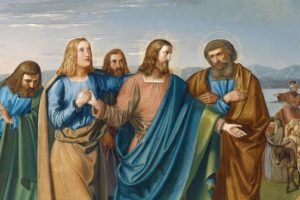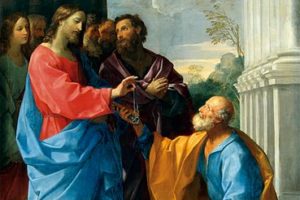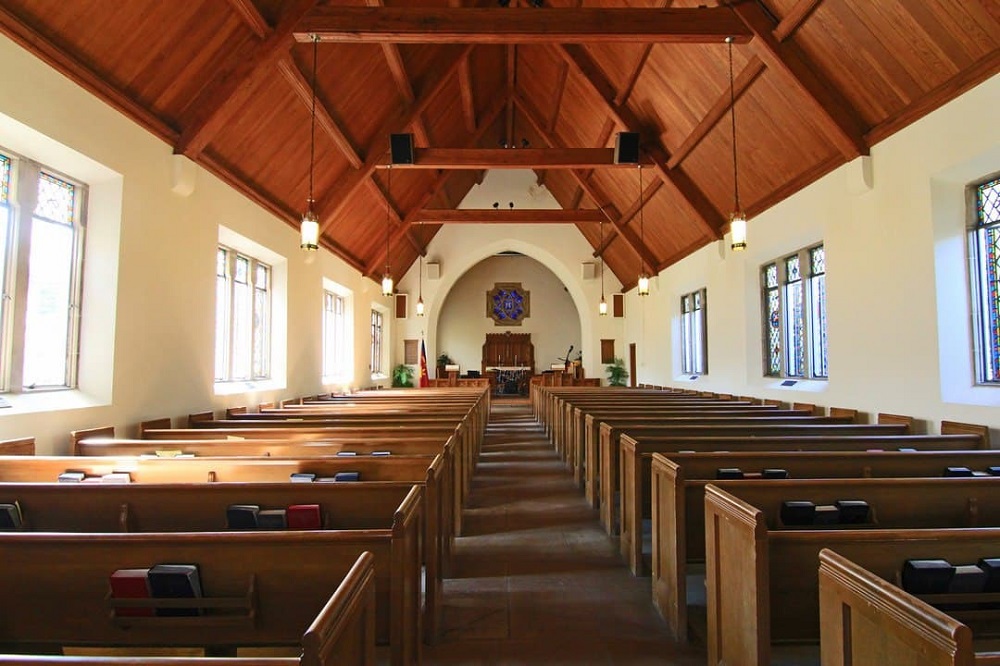Last edited on 22/Jun/2021
The Bible’s Answer
When most people think of the word church, they think of the buildings in which Christians worship, or of specific Christian denominations, like the Lutheran Church or the Roman Catholic Church. In the Bible, however, the word for “church” comes from the Greek word “ecclesia”, which simply means “a gathering” or “congregation” (Large Catechism II 47–49).1
In biblical usage, therefore, we can say that the church is the congregation of all Christians (Psalm 149:1; 1 Corinthians 1:2–3) (Augsburg Confession VIII 1).2 Based on additional Bible teachings, the church is correctly defined as the congregation of Christians in which the gospel is purely taught (Galatians 1:8–9) and the sacraments are correctly administered (Matthew 28:19–20; 1 Corinthians 11:23–26) (Augsburg Confession VII 1).3
The Congregation of Christians
The Bible calls the church the body of Christ (Colossians 1:24), and says that Christ is the head of the body (Colossians 1:18). It also says that Christians are members of the body of Christ through baptism (1 Corinthians 12:13, 27). Therefore, Christians are the church. In baptism, by faith in Jesus, Christians receive the forgiveness of sins and all the benefits of Jesus’ atonement, and therefore are holy in God’s eyes (Acts 2:38). This is why they are called saints, or holy ones (Romans 1:7). Therefore, we see in Paul’s first letter to the Corinthians, that the church, or Christ’s body, is itself the saints who call upon Jesus’ name:
To the church of God that is in Corinth, to those sanctified [made holy] in Christ Jesus, called to be saints together with all those who in every place call upon the name of our Lord Jesus Christ, both their Lord and ours: Grace to you and peace from God our Father and the Lord Jesus Christ. (1 Corinthians 1:2–3, ESVUK)
Since Christians are the church, the church is not a building or place of worship, even though we commonly use it in that sense today. The church is also not one particular Christian denomination or group (or one that claims to be Christian). To the contrary, the true church is present wherever Christians gather together in Jesus’ name. Jesus said: “For where two or three are gathered in my name, there am I among them” (Matthew 18:20). To teach that one group or sect is alone the true “church” is to also deny the gospel, which teaches that “Whoever believes and is baptized will be saved” (Mark 16:16), regardless of what one earthly organisation they join (human works) (Ephesians 2:8–9; see also Galatians 1:8–9).
The Gospel Purely Taught
In the true church—the gathering of saints or true believers in Christ—the gospel is correctly taught. This is because the true gospel, through which the Holy Spirit works to create faith in people (1 Thessalonians 1:5), saves everyone who believes in it (Romans 1:16), and thus makes true Christians. The Apostle Peter wrote:
Having purified your souls by your obedience to the truth for a sincere brotherly love, love one another earnestly from a pure heart, since you have been born again, not of perishable seed but of imperishable, through the living and abiding word of God … And this word is the good news [gospel] that was preached to you. (1 Peter 1:22–23, 25b)
Since the gospel is that which makes people born again—the moment of conversion, when our old sinful self dies (Romans 6:6–8), and our new self, sanctified and being formed into Christ’s image, is raised in its place (Colossians 3:1–4; Ephesians 4:23–24), the true gospel is necessary for the church to exist. The gospel is the good news that Jesus died for all our sins on the cross, was buried, and resurrected on the third day (1 Corinthians 15:1–4), so that whoever believes in this will be forgiven by God of all their sins and have eternal life in Heaven (Romans 3:21–26), not by their works, but by God’s grace alone (Ephesians 2:8–9). If a false gospel is taught in a gathering of people who claim to be Christian, then such a gathering is not Christian, but of the devil himself (Galatians 1:8–9).
The Sacraments Correctly Administered
It is vital to understand, also, that in the church, or the gathering/congregation of true Christian believers, the sacraments are properly administered. These include baptism and Holy Communion. Because God creates and strengthens true faith in us in the sacraments, the church cannot exist without them. Jesus gave the church the following command:
Go therefore and make disciples of all nations, baptizing them in the name of the Father and of the Son and of the Holy Spirit, teaching them to observe all that I have commanded you. And behold, I am with you always, to the end of the age. (Matthew 28:19–20)
The way in which we become Jesus’ disciples is by being baptised, and learning and believing in his teachings. Elsewhere, Paul teaches that baptism is our initiation into the church (1 Corinthians 12:13, 27), and that in baptism, we are saved (1 Peter 3:21). Therefore, the church must administer this correctly, in order to keep Christ’s command. The Apostle Paul relayed Jesus’ command on Holy Communion in the following Scripture:
For I received from the Lord what I also delivered to you, that the Lord Jesus on the night when he was betrayed took bread, and when he had given thanks, he broke it, and said, “This is my body which is for you. Do this in remembrance of me.” In the same way also he took the cup, after supper, saying, “This cup is the new covenant in my blood. Do this, as often as you drink it, in remembrance of me.” For as often as you eat this bread and drink the cup, you proclaim the Lord’s death until he comes. (1 Corinthians 11:23–26)
Here, Jesus teaches that the church is to commemorate his sacrificial death in eating and drinking bread and wine, which are his true body and blood. By giving us his life-giving body and blood, we receive the forgiveness of sins (Matthew 26:28; John 6:53–56). Jesus clearly implies that we are to do this regularly, in his words “Do this, as often as you drink it, in remembrance of me”. In obedience to this command, the church “broke bread” (which refers to Holy Communion) each day (Acts 2:46), and later, each Sunday (Acts 20:7).
What About Christian Denominations?
Since Christians are the church, the people of God (1 Peter 2:9–10), this means that Christians of all Christian denominations which faithfully teach the core doctrines of the Bible, especially the gospel, and administer the sacraments correctly, are part of Jesus’ church. The historical Christian denominations, which consist of Roman Catholicism, Eastern Orthodoxy, and Protestantism and its various denominations (Lutheranism, Calvinism, Methodism, etc.), are all part of Jesus Christ’s church. This is because together they each affirm the Bible’s central teachings, as confessed in the three Ecumenical Christian Creeds: the Apostles’, Nicene, and Athanasian Creeds.
It is not a person’s membership in a specific denomination or church group that saves them, after all, but Jesus Christ and his works alone (Galatians 2:21), through their God-given faith in biblical doctrine, which makes them a part of Jesus’ church (John 6:47; 10:9; Acts 15:8–9)—the gathering of his people. What is the point of Christian denominations and church buildings, then? The different Christian denominations are the means by which Christians can be part of a local church community which shares a common creed, confession, or statement of faith of the Scriptures. In these Christian communities, they can meet together, have fellowship (Hebrews 10:24–25), worship God (Psalm 116:12–14), and receive his gifts for the benefit of their faith (Romans 10:14, 17).
Some church confessions are more biblical than others. Redemption of Humanity believes that the Book of Concord—which is the complete collection of the Lutheran confessions—is the closest confession to the Bible’s teachings. This, however, does not mean that churches which have some doctrinal errors are not Christian. Although false doctrines are harmful to people and should be corrected, a church community is Christian so long as they share the common faith in the true God, who is the Blessed Trinity: Father, Son, and Holy Spirit, the biblical gospel, and their participation in Jesus’ sacraments.
How Does the Church Worship Together?
Each Christian denomination holds church services in a designated building or some other meeting place, on a specific day of the week (usually Sundays, the day on which Jesus was resurrected). In each of these services, a pastor (or more than one pastor) leads the congregation in the liturgy, which is the standard order of how church worship is conducted. The Bible does not give Christians a set liturgy, and so no Christian denomination has the same liturgical order. However, every church liturgy has many things in common with one another, because God’s Word does give us some guidelines on what should be included in church worship.
- In every Christian church service, there is a pastor (or pastors) who leads the service (1 Timothy 3:1–7; Hebrews 13:17).
- The pastor preaches a sermon to the congregation, which is a message from God’s Word interpreted to the people of today (Acts 20:7; 2 Timothy 4:1–2; Malachi 2:7; Nehemiah 8:7–8).
- The congregation sings hymns, which are songs of praise to God based on the words of the Bible, or worship songs, which are the modern variant of hymns (Colossians 3:16; 2 Chronicles 5:11–13; Psalm 147:7).
- There are Bible readings in each church service (1 Timothy 4:13; Nehemiah 8:2–3).
- The congregation prays for the church and the world, based upon current needs (1 Timothy 2:1–2; Isaiah 56:7; 2 Chronicles 6:21, 28–31).
- The pastors (and their assistants, if required) administer Holy Communion to all members of the congregation (1 Corinthians 11:23–26; Acts 2:46) who are baptised and have been taught (or catechised) about the sacrament (so that they can properly examine themselves, see 1 Corinthians 11:27–31).
- The congregation proclaims the Christian faith in the words of one of the three Bible-based Ecumenical Christian Creeds, such as the Nicene Creed (based on passages like Matthew 10:32, Romans 10:9, and Isaiah 12:4).
- The congregation confesses their sins to God (Nehemiah 9:2–3), and the pastor, who represents Jesus Christ, absolves those who have truly repented on Jesus’ behalf (John 20:22–23).
- There is also the opportunity to donate to the church, as a free-will offering of thanksgiving to God (2 Corinthians 9:7; Deuteronomy 12:6), and for the work of the pastors (1 Corinthians 9:14).
- At the end of the service, Christians may have fellowship to encourage one another before leaving (Hebrews 10:24–25).
See Also
- Should Christians Go to Church?
- Is There a One True Church?
- What Is Christianity?
- Are We Saved by Our Good Works?
Notes
- Paul Timothy McCain, Edward Andrew Engelbrecht, Robert Cleveland Baker, Gene Edward Veith, eds., Concordia: The Lutheran Confessions (Saint Louis: Concordia Publishing House, 2006), 404.
- Ibid, 34.
- Ibid.
Bibliography
Paul Timothy McCain, Edward Andrew Engelbrecht, Robert Cleveland Baker, and Gene Edward Veith, eds. Concordia: The Lutheran Confessions. Concordia Publishing House: Saint Louis, 2006.






